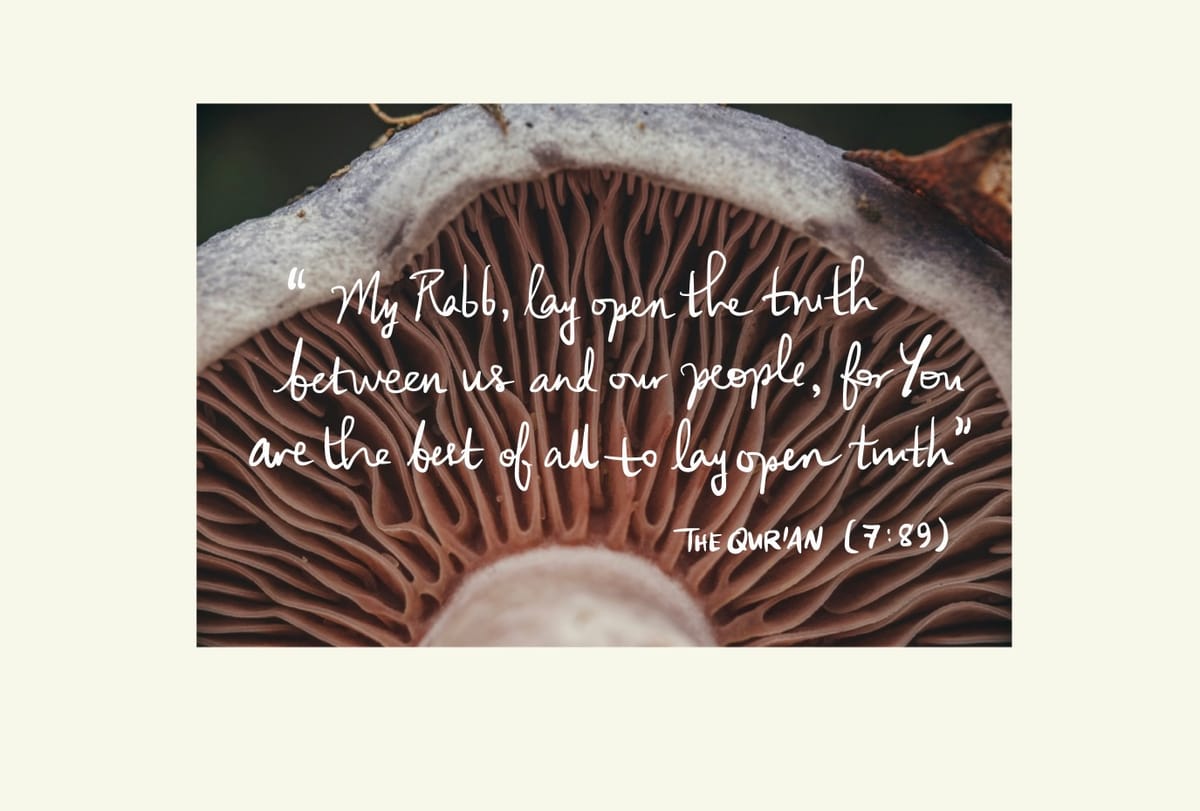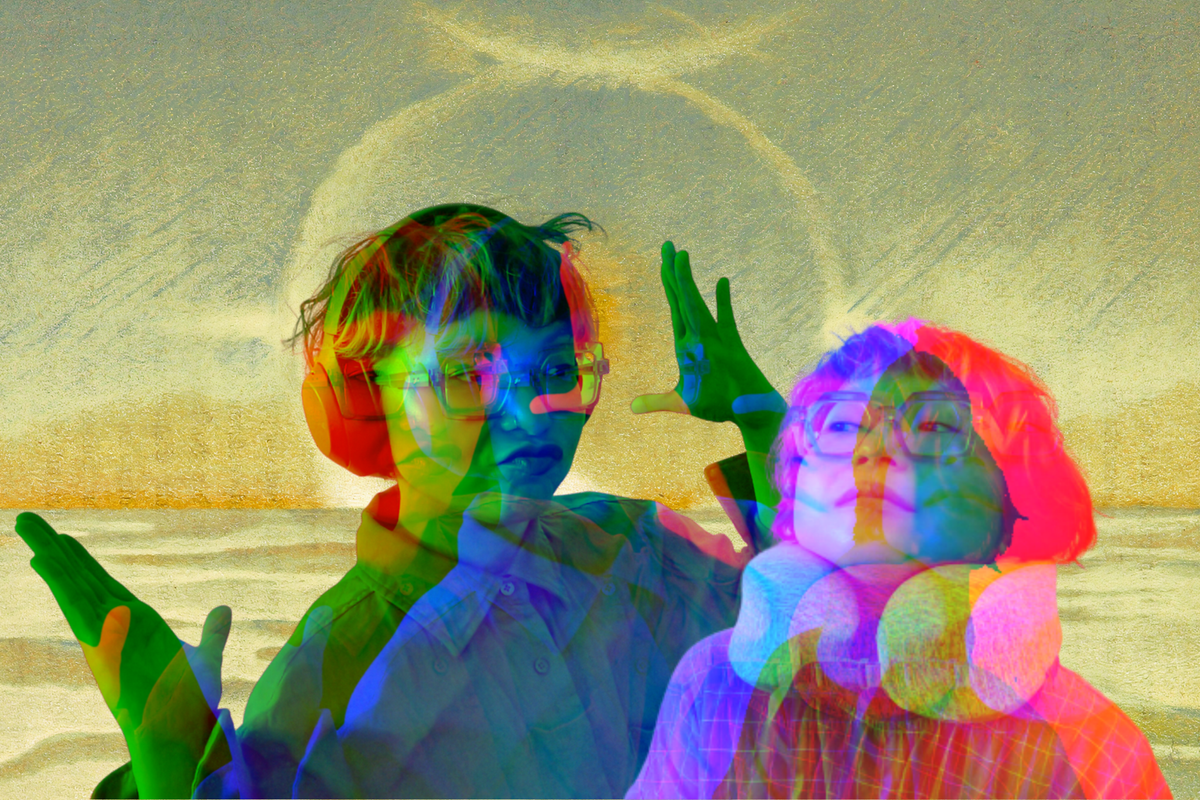BASELINE | From beliefs to action
5 ways this strange Muslim tries to move in the world.

“Islam began as something strange and it will return to being strange, so blessed are the strangers.” — Muhammadﷺ
⬛
From what I know to be true, to believe is to: seek truth everywhere, follow clear evidence, prioritise Divine authority, reject oppression in faith, and challenge hierarchies and supremacy.
- Explore signs of Truth that are inscribed in my existence, that of other living beings, and out in the world, not just from within sacred texts.
- Seek knowledge and change our minds+actions in the face of clear evidence.
- Never worship, submit, or devote myself to any modern construct or human power above the Source.
- Abolish relational hierarchies of domination and exclusion.
- Resist cruelty and oppression in the name of an All-Compassionate Creator.
These are the beliefs that inform my values and how I intend to move in the world.
Seek Truth everywhere
To believe is to explore signs of Truth inscribed in my existence, that of other living beings, and in the world, not just from sacred texts.
- I write because I was asked to convey a verse. Hopefully it may benefit someone else, wandering back but anxious about befriending divine revelation.
- Signs of Truth exist in ourselves too— in nature and in people— and not just in the Qur'ān and Sunnah (41:53, 45:3-4, 51:20-21). Although the Qur'ān is the primary source of Islam, it is not our only way of knowing. There are verses of knowledge from here out to the cosmos and deep within the universe of our own bodies. So our journeys contain signs for all to learn from in explorations of compassion, spirituality, and solidarity.
- In all our intense diversity, the Beloved only distinguishes between us on the basis of something no human is able to truly perceive in others (3:179, 49:13).
- There are inevitable consequences for our relationships with care, power, and supremacy. Pride and arrogance must be strongly condemned (39:60, 39:72, 40:35). Surely we will be held accountable for how confidently we dominated and alienated each other.
Follow clear evidence
To believe is to seek knowledge and change our minds and actions when the evidence is clear.
- I disavow narrow, literal, and sectarian readings of the Qur'ān. Muslims believe the Qur'ān is an instance of Divine disclosure revealed in 7th century Arabia that is meant for all times and ages. This means accepting that some of its signs can only be understood in later times.
- As collective knowledge of Reality grows— and we must increase our knowledge (20:114)— we cannot cling to past interpretations of a matter if evidence in the present is clear.
- Muhammadﷺ in his final speech to his followers even said of his struggle that "all those who listen to me shall pass on my words to others and those to others again; and it may be that the last ones understand my words better than those who listen to me directly."
- The end of Islamic prophecy is an invitation for each of us to be caretakers and ethical agents of social change. We must use our reason and current location in human history to adjust our positions in the face of clear evidence, and use that knowledge to struggle for justice. I write to connect revelation and reason, to be part of a dynamic and living Islam.
Prioritise Divine authority
To believe is to not worship, prioritise, or devote ourselves to any modern construct or human power above the Source.
- Islam rejects the notion of a clergy, central church, hierarchy or hereditary rule. Humanity was created from an agender being, not a man's rib (7:189). All messengers were mortals, albeit inspired (21:7).
- The only unforgivable sin in Islam is to deify any creation as equal to the Source of all creation (4:48, 4:116, 4:3, 23:116-117). In a time where power abuse, wealth, and the market are openly worshipped, we must consider as idolatry any blind loyalty to nation-states, leaders and "experts", materialism, celebrity culture, social hierarchies, political rulers, scholars, tribes and family ties.
- To be Muslim is to struggle against domination, coercion, and false idols. Nationalism becomes idolatry if it replaces loyalty to the Beloved with allegiance to earthly entities. Being told not to ask questions and pressured into distrusting the sense the Divine gave you is a red flag. Nothing about Islam requires you to give unquestioned obedience to any person.
Challenge hierarchies and supremacy
To believe is to struggle to abolish relational hierarchies of domination and exclusion.
- I do not believe that faith can be meaningfully assigned at birth. I believe faith can only chosen later in life as a state of engaged surrender. It is practiced by translating one's spiritual growth into physical commitments.
- I write not to preach to non-Muslims or lead Muslims astray, but to express myself and share notes from my study practice. It is not possible for over a billion Muslims to agree with each other. But I hope we can at least agree that because A!!ah is a Singularity that cannot be divided yet created everything, that everything radiates from one Source and participates in A!!ah's unity. This means no matter how it seems externally, ultimate separation between Creator and creature or one and another is internally just an illusion. To accept A!!ah's presence is to understand that there can only be a non-hierarchical relationship of horizontal (or equal) reciprocity between us all.
- It is not the Beloved who wrongs people, people wrong themselves, through control and domination. Our fundamental enemy is the virus that corrupts our desires and transforms us into mini-gods. I hold to the motivation mortal messenger Muhammadﷺ had of a more loving world for women and children.
Reject oppression in faith
To believe is to never justify cruelty and oppression in the name of the Beloved Ar-Rahman, Ar-Rahim.
- A theology of rejection and persecution is incompatible with belief in an All-Compassionate God. The Divine Creator forefronted Their chosen names of ar-Rahman and ar-Rahim; Rahman is used to refer to A!!ah throughout the Qur’an in a way that no other of Their 99 Names (Asma ul-Husna) are. Because it is no mistake that Rahma is foregrounded, when we consider all possible meanings of a verse or hadith, we must choose the one that displays the most Rahma.
- Rahma grounds the basic principles of Quranic and Divine engagement (1:1, 6:12, 6:54, 17:82, 21:107). The Prophetﷺ's mission was one motivated by concern of the suffering in his community and their wellbeing (9:128).
- Ibn Qayyim al-Jawyziyah said: "Shariah is meant to be built on justice, compassion, and humanity, whoever uses religious interpretations to justify cruelty, oppression, and discrimination has no part in shariah even if they lean on Quranic verses and hadith."

See also:
BASICS
My baseline as a believer that informs my values and positions in the world, followed by my emotional support Quranic bookmarks and ongoing hadith collection.

Spirit Garden - Liy Learned That
At this point, God is mine: Notes where I practice being the Muslim ancestor of my dreams.

🪬
Liy is a tropical cryptid in Southeast Asia foraging for narrative resources from the periphery to prepare for precarious futures. This is an ad-free space outside of the algo. If you're new here (hello!) or need a refresher, start here for house rules. Here is what I am up to now. I spend time thinking out of my zettelkasten notes system and sharing curated playlists from my time travels. Consider subscribing (it's free!) to read more and stay in touch: I only send out letters a few times a year. If you valued something here, say so (if we have access to each other) or it means so much to buy me a coffee— that sends me a signal to keep going.

